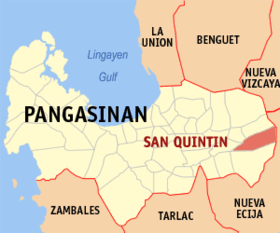San Quintin, Pangasinan
Appearance
Page Module:Infobox/styles.css has no content.
| San Quintin | |
|---|---|
| Baley na Filipinas | |
 | |
 Lokasyon na San Quintin | |
 | |
| 15°59′4″N 120°48′54″E | |
| Dalin | Filipinas |
| Barangay | 21 |
| Kaawang | |
| • Katiponan | 115.90 km2 (44.75 sq mi) |
| Elebasyon | 146 m (479 ft) |
| Bilang na too (Mayo 1, 2020)[1] | |
| • Katiponan | 33,980 |
| • Densidad | 290/km2 (760/sq mi) |
| Economia | |
| • Clase | kumatlo ya klase ya baley |
| • Ingresos | ₱134,300,670.42 (2020) |
| • Activos | ₱201,021,705.84 (2020) |
| • Pasivos | ₱37,856,853.86 (2020) |
| • Gastos | ₱112,195,215.33 (2020) |
| Kodigo na postal | 2444 |
| Kodigo na lugar | 75 |
| Website | sanquintinpangasinan |
Say San Quintin et kumatlo ya klase ya baley ed luyag na Pangasinan, Filipinas. Unong ed 1 Mayo 2020 census, say populasyon to et 33,980 totoo tan 8,683 abong. Walay kabaleg tan sukat to ya 115.90 sq. km. Say zip code to et 2444.
Saray barangay
[dumaen | dumaen so pinanlapuan]- Alac
- Baligayan
- Bantog
- Bolintaguen
- Cabangaran
- Cabalaoangan
- Calomboyan
- Carayacan
- Casantamarian
- Gonzalo
- Labuan
- Lagasit
- Lumayao
- Mabini
- Mantacdang
- Nangapugan
- San Pedro
- Ungib
- Poblacion Zone I
- Poblacion Zone II
- Poblacion Zone III
Demograpiko
[dumaen | dumaen so pinanlapuan]| Taon | Pop. | ±% p.a. |
|---|---|---|
| 1903 | 8,092 | — |
| 1918 | 9,762 | +1.26% |
| 1939 | 12,833 | +1.31% |
| 1948 | 15,330 | +2.00% |
| 1960 | 16,444 | +0.59% |
| 1970 | 18,842 | +1.37% |
| 1975 | 20,381 | +1.59% |
| 1980 | 20,835 | +0.44% |
| 1990 | 24,293 | +1.55% |
| 1995 | 26,257 | +1.47% |
| 2000 | 28,258 | +1.59% |
| 2007 | 30,556 | +1.08% |
| 2010 | 32,626 | +2.41% |
| 2015 | 32,945 | +0.19% |
| 2020 | 33,980 | +0.61% |
| Reperensiya: Philippine Statistics Authority[2][3][4] | ||
Saray reperensiya
[dumaen | dumaen so pinanlapuan]- ↑ "2020 Census of Population and Housing (2020 CPH) Population Counts Declared Official by the President". Hulyo 7, 2021. https://psa.gov.ph/content/2020-census-population-and-housing-2020-cph-population-counts-declared-official-president.
- ↑ Census of Population (2015). "Region I (Ilocos Region)". Total Population by Province, City, Municipality and Barangay. PSA. Retrieved 29 June 2016.
- ↑ Census of Population and Housing (2010). "Region I (Ilocos Region)". Total Population by Province, City, Municipality and Barangay. NSO. Retrieved 29 June 2016.
- ↑ Censuses of Population (1903–2007). "Region I (Ilocos Region)". Table 1. Population Enumerated in Various Censuses by Province/Highly Urbanized City: 1903 to 2007. NSO.
